The Raven Poem
Explore Edgar Allan Poe's "The Raven," also read our analysis, frequently asked questions, and related resources.
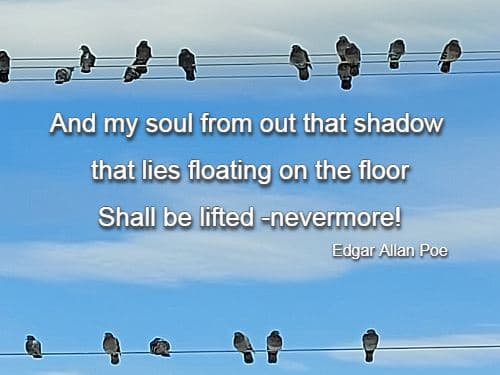
Updated August 28, 2025, by Catherine Pulsifer
The Raven
Once upon a midnight dreary, while I pondered, weak and weary,
Over many a quaint and curious volume of forgotten lore -
While I nodded, nearly napping, suddenly there came a tapping,
As of some one gently rapping, rapping at my chamber door.
"'Tis some visitor,” I muttered, “tapping at my chamber door -
Only this and nothing more."
Ah, distinctly I remember it was in the bleak December;
And each separate dying ember wrought its ghost upon the floor.
Eagerly I wished the morrow; -vainly I had sought to borrow
From my books surcease of sorrow - sorrow for the lost Lenore -
For the rare and radiant maiden whom the angels name Lenore -
Nameless here for evermore.
And the silken, sad, uncertain rustling of each purple curtain
Thrilled me -filled me with fantastic terrors never felt before;
So that now, to still the beating of my heart, I stood repeating
"'Tis some visitor entreating entrance at my chamber door -
Some late visitor entreating entrance at my chamber door; -
This it is and nothing more."
Presently my soul grew stronger; hesitating then no longer,
"Sir,” said I, “or Madam, truly your forgiveness I implore;
But the fact is I was napping, and so gently you came rapping,
And so faintly you came tapping, tapping at my chamber door,
That I scarce was sure I heard you" - here I opened wide the door; -
Darkness there and nothing more.
Deep into that darkness peering, long I stood there wondering, fearing,
Doubting, dreaming dreams no mortal ever dared to dream before;
But the silence was unbroken, and the stillness gave no token,
And the only word there spoken was the whispered word, "Lenore?"
This I whispered, and an echo murmured back the word, "Lenore!" -
Merely this and nothing more.
Back into the chamber turning, all my soul within me burning,
Soon again I heard a tapping somewhat louder than before.
"Surely,” said I, "surely that is something at my window lattice;
Let me see, then, what thereat is, and this mystery explore -
Let my heart be still a moment and this mystery explore; -
'Tis the wind and nothing more!"
Open here I flung the shutter, when, with many a flirt and flutter,
In there stepped a stately Raven of the saintly days of yore;
Not the least obeisance made he; not a minute stopped or stayed he;
But, with mien of lord or lady, perched above my chamber door -
Perched upon a bust of Pallas just above my chamber door -
Perched, and sat, and nothing more.
Then this ebony bird beguiling my sad fancy into smiling,
By the grave and stern decorum of the countenance it wore,
"Though thy crest be shorn and shaven, thou,” I said, "art sure no craven,
Ghastly grim and ancient Raven wandering from the Nightly shore -
Tell me what thy lordly name is on the Night’s Plutonian shore!"
Quoth the Raven "Nevermore."
Much I marvelled this ungainly fowl to hear discourse so plainly,
Though its answer little meaning - little relevancy bore;
For we cannot help agreeing that no living human being
Ever yet was blessed with seeing bird above his chamber door -
Bird or beast upon the sculptured bust above his chamber door,
With such name as "Nevermore."
But the Raven, sitting lonely on the placid bust, spoke only
That one word, as if his soul in that one word he did outpour.
Nothing farther then he uttered—not a feather then he fluttered -
Till I scarcely more than muttered "Other friends have flown before -
On the morrow he will leave me, as my Hopes have flown before."
Then the bird said "Nevermore."
Startled at the stillness broken by reply so aptly spoken,
"Doubtless," said I, "what it utters is its only stock and store
Caught from some unhappy master whom unmerciful Disaster
Followed fast and followed faster till his songs one burden bore -
Till the dirges of his Hope that melancholy burden bore
Of 'Never—nevermore'."
But the Raven still beguiling all my fancy into smiling,
Straight I wheeled a cushioned seat in front of bird, and bust and door;
Then, upon the velvet sinking, I betook myself to linking
Fancy unto fancy, thinking what this ominous bird of yore -
What this grim, ungainly, ghastly, gaunt, and ominous bird of yore
Meant in croaking "Nevermore."
This I sat engaged in guessing, but no syllable expressing
To the fowl whose fiery eyes now burned into my bosom’s core;
This and more I sat divining, with my head at ease reclining
On the cushion’s velvet lining that the lamp-light gloated o'er,
But whose velvet-violet lining with the lamp-light gloating o'er,
She shall press, ah, nevermore!
Then, methought, the air grew denser, perfumed from an unseen censer
Swung by Seraphim whose foot-falls tinkled on the tufted floor.
"Wretch," I cried, "thy God hath lent thee - by these angels he hath sent thee
Respite - respite and nepenthe from thy memories of Lenore;
Quaff, oh quaff this kind nepenthe and forget this lost Lenore!"
Quoth the Raven "Nevermore."
"Prophet!" said I, "thing of evil! -prophet still, if bird or devil! -
Whether Tempter sent, or whether tempest tossed thee here ashore,
Desolate yet all undaunted, on this desert land enchanted -
On this home by Horror haunted—tell me truly, I implore -
Is there -is there balm in Gilead? -tell me -tell me, I implore!"
Quoth the Raven "Nevermore."
"Prophet!" said I, "thing of evil! - prophet still, if bird or devil!
By that Heaven that bends above us - by that God we both adore -
Tell this soul with sorrow laden if, within the distant Aidenn,
It shall clasp a sainted maiden whom the angels name Lenore -
Clasp a rare and radiant maiden whom the angels name Lenore."
Quoth the Raven "Nevermore."
"Be that word our sign of parting, bird or fiend!" I shrieked, upstarting -
"Get thee back into the tempest and the Night’s Plutonian shore!
Leave no black plume as a token of that lie thy soul hath spoken!
Leave my loneliness unbroken! - quit the bust above my door!
Take thy beak from out my heart, and take thy form from off my door!"
Quoth the Raven "Nevermore."
And the Raven, never flitting, still is sitting, still is sitting
On the pallid bust of Pallas just above my chamber door;
And his eyes have all the seeming of a demon’s that is dreaming,
And the lamp-light o’er him streaming throws his shadow on the floor;
And my soul from out that shadow that lies floating on the floor
Shall be lifted -nevermore!
Analysis of the Poem
This famous poem by Edgar Allan Poe, The Raven, delves deeply into themes of loss, mourning, and despair, as the narrator confronts the overwhelming grief over the death of his beloved Lenore.
The poem’s dark and gothic atmosphere reflects the inner turmoil of the narrator, who is caught between yearning for comfort and acceptance of his suffering.
The poem opens on a "midnight dreary," where the narrator is found weak and weary, suggesting a sense of exhaustion both physically and emotionally. He is trying to distract himself by reading
"forgotten lore," but his sorrow over Lenore is ever-present. Lenore is described as a "rare and radiant maiden," a symbol of purity and beauty, now lost to him forever.
The arrival of the raven, a black bird often associated with bad omens, intensifies the eerie and foreboding mood of the poem. The bird perches on a bust of Pallas, the Greek goddess of
wisdom, implying a conflict between reason and emotion. The raven’s repetitive response, "Nevermore," becomes a haunting refrain that mirrors
the narrator’s descent into hopelessness. Initially, he dismisses the bird’s speech as a mere echo of his own thoughts, but as the poem progresses, the word takes on deeper meaning, reinforcing the permanence
of his loss.
The poet desperately questions the raven, seeking solace and hope that he will be reunited with Lenore in the afterlife.
He asks if there is "balm in Gilead," a reference to healing and spiritual relief,
but the raven's reply of "Nevermore" shatters his hopes. With each question, the raven’s response becomes more crushing, symbolizing the futility of searching for answers in the face of grief.
By the end of the poem, the narrator is consumed by his sorrow. The raven, now a permanent figure in the room, symbolizes the inescapability of his despair.
The final lines suggest that the narrator’s soul will remain trapped in the shadow of grief forever, as he declares that it "shall be lifted -nevermore."
In essence, The Raven, explores how grief can overwhelm the mind, distorting reality and leaving a person unable to escape the shadow of loss. The raven represents an unrelenting reminder that some wounds never heal, and the sorrow for the lost Lenore will haunt the narrator endlessly.
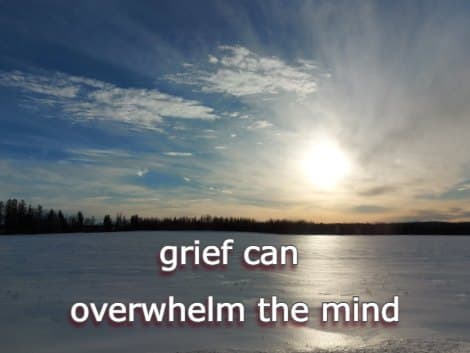
Popular Pages:
Exploring the depths of Edgar Allan Poe's "The Raven" can be a profound journey. To further enrich your understanding and find comfort, consider these related pages:

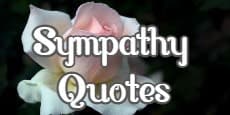
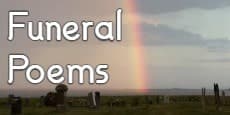
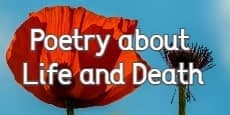
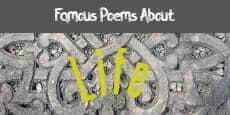
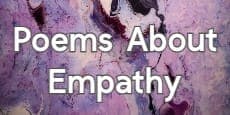
Conclusion:
Edgar Allan Poe’s The Raven continues to leave a lasting impression with its vivid imagery and deep emotion. Though written in 1845, the sorrow and searching found in the poem still speak to the heart today. The haunting word “Nevermore” echoes the pain of grief and the struggle to find peace when loss darkens our days.
Poe reminds us that sorrow is part of the human journey, but through his words, we also see the longing for comfort and understanding. His gift for expressing emotion through poetry helps us reflect on our own experiences, offering a glimpse into the depths of mourning and the hope that can follow.
As we close this page, may The Raven not only stir our minds but also open our hearts to compassion—for ourselves and for others who face life’s darker moments.
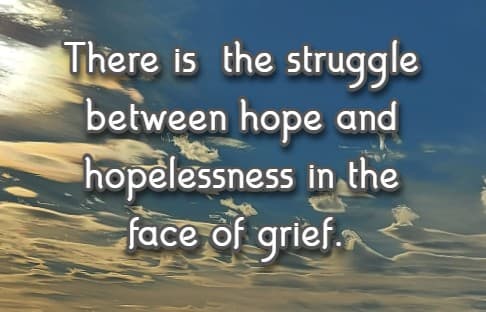
More Short Poems of Edgar Allan Poe
Frequently Asked Questions
What is the main theme of The Raven?
The main theme of The Raven is grief and loss. The poem explores how overwhelming sorrow, particularly over the death of a loved one, can lead to despair and even madness. It also touches on themes of hopelessness, as the narrator's desperate search for meaning and solace is met with the raven's relentless refrain of "Nevermore."
Why does the narrator keep asking the raven questions if he knows the answer is always "Nevermore"?
The narrator's repeated questioning of the raven reflects his growing desperation. Although he expects the bird to say "Nevermore," he continues asking in the faint hope of receiving a different answer. His persistence highlights the struggle between hope and hopelessness in the face of grief.
What does the raven symbolize in the poem?
The raven symbolizes death, despair, and the permanence of loss. Its dark, foreboding presence and repeated refrain of "Nevermore" suggest that the narrator's grief and suffering will never end. Some interpretations also view the raven as a symbol of fate or an embodiment of the narrator’s tortured mind.
What is the significance of the poem’s setting?
The poem is set in a dark, dreary room late at night, with the month of December adding to the cold, bleak atmosphere. This setting mirrors the narrator’s emotional state -lonely, sorrowful, and consumed by thoughts of death. The isolation of the room also enhances the gothic tone of the poem, creating a sense of foreboding and dread.
How does The Raven reflect Edgar Allan Poe's writing style?
The Raven showcases Poe’s signature gothic style, with its eerie atmosphere, use of the supernatural, and exploration of dark emotions like grief and despair. Poe’s use of musical language, internal rhyme, and alliteration adds to the haunting and rhythmic quality of the poem, making it both melodious and unsettling.